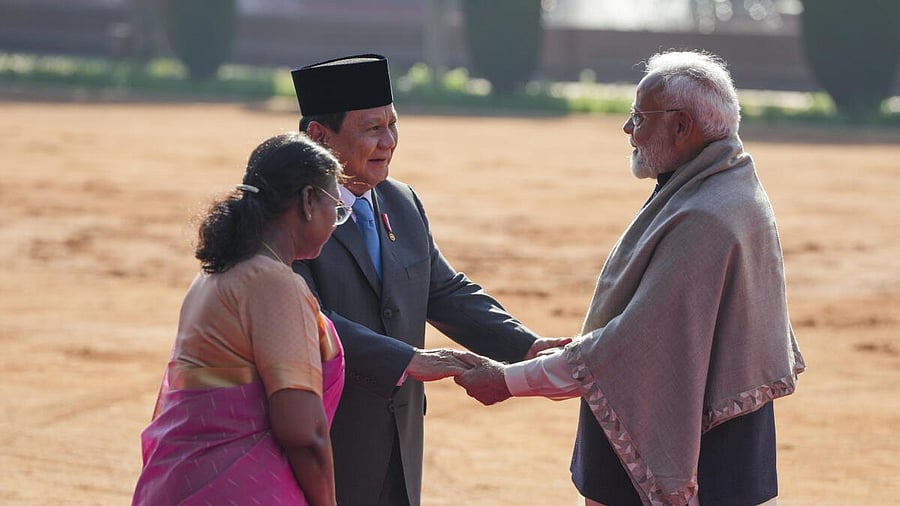
President Droupadi Murmu, Prime Minister Narendra Modi with Indonesian President Prabowo Subianto on the latter's arrival for the ceremonial welcome, at Rashtrapati Bhavan in New Delhi.
Credit: PTI Photo
New Delhi: Indonesia is likely to send a delegation of senior officials to India to explore ways to advance bilateral defence cooperation, even as the two nations on Saturday inked an agreement to create a framework for cooperation between the coast guards of the two nations on maritime safety and security.
“Indonesia is our important partner in the ASEAN and Indo-Pacific regions. Both countries are committed to maintaining peace, security, prosperity and rules-based order in this entire region,” Prime Minister Narendra Modi told journalists as he hosted President Prabowo Subianto of the Southeast Asian nation in New Delhi. “We agree that freedom of navigation must be ensured in accordance with international laws,” Modi said, subtly underlining the growing concerns in New Delhi and other capitals around the world over China’s expansionist moves in the Indo-Pacific region, be it in South China Sea and East China Sea, or Taiwan Strait.
Subianto, who took over as the President of Indonesia on October 20 last year, however, refrained from commenting on the Indo-Pacific region while speaking to journalists after his meeting with Modi.
A joint statement issued after his meeting with President Xi Jinping during his visit to Beijing in November 2024 had referred to the willingness of Jakarta and Beijing to jointly promote fisheries and explore oil and gas resources in the South China Sea areas, where Indonesia and China had been staking overlapping claims. This had fuelled speculation within the ASEAN (Association of Southeast Asian Nations) if Indonesia had buckled under the pressure of China and implicitly recognise the territorial claims of the communist country on its own waters.
As New Delhi invited Subianto to be the chief guest at the 76th Republic Day ceremony, speculation was rife that he and Modi would add momentum to bilateral defence cooperation, particularly making progress on the sale of the BrahMos missiles made in India to Indonesia.
The two sides, however, refrained from announcing any such specific deal after the meeting between the two leaders in New Delhi on Saturday.
“To strengthen our cooperation in the defence sector, we have decided to work together in the areas of defence manufacturing and supply chain,” the prime minister said. “We recently ratified the defence cooperation agreement, and we will send a high-level delegation in the field of defence as soon as possible,” added the president of Indonesia.
Just ahead of Subianto’s visit to New Delhi, Indonesia’s defence minister Sjafrie Sjamsoeddin met his Chinese counterpart Dong Jun in Beijing on Wednesday. They agreed to focus on the transfer of military technology from China to Indonesia and expanding military-to-military contact and cooperation.
The pact the coast guards of India and Indonesia signed on Saturday will strengthen the cooperation between the two nations in the areas of crime prevention, search and rescue, and capacity building, Modi said after his meeting with Subianto at Hyderabad House in New Delhi. The two leaders emphasised cooperation in cybersecurity, counterterrorism and deradicalisation.
“In the sectors of health and food security, India is sharing its learnings and experience from the mid-day meal scheme and the public distribution system with Indonesia. We have also decided that we will work together in energy, critical minerals, science and technology, space and STEM education sectors,” the prime minister said. “The disaster management authorities of both countries shall also come together to perform joint exercises.”
Jaideep Mazumdar, Secretary (East) at the Ministry of External Affairs, later told journalists that the Indonesian president had sought Indian investments in almost all infrastructure sectors including in ports, airports and railways. He specifically mentioned that Indian companies could invest in developing Sabang Port in Aceh, Indonesia.
Indonesia’s Sabang Port is located close to Andaman and Nicobar Island – precisely 104 nautical miles from India’s southernmost tip, Indira Point, and 376 nautical miles from Port Blair. It is just 500 kilometres away from the Malacca Strait, a narrow stretch of water between the Malay Peninsula to the northeast and the Sumatra Island of Indonesia to the southwest, connecting the Andaman Sea and the South China Sea. The Malacca Strait is considered one of the crucial maritime chokepoints on the sea lanes in the Indian Ocean region.
If India develops the Sabang Port of Indonesia as a strategic asset, the facility – along with the INS Baaz naval air station in Andaman and Nicobar Island – will give the Indian Navy an edge against China’s People’s Liberation Army Navy, which over the past few years stepped up its forays in the Indian Ocean region. It will also help monitor the maritime traffic in the region.
When Modi had visited Jakarta in May 2018, he and Subianto’s predecessor Widodo announced the constitution of a joint task force “to undertake projects for port-related infrastructure in and around Sabang” in Indonesia. Though the Covid-19 pandemic slowed down the process, the two sides last year completed the joint feasibility study for the projects for the development of the Sabang Port.
Modi on Saturday told Subianto that India, which helped restore the ancient Buddhist Borobudur Temple in Indonesia, would now also contribute towards the conservation efforts of the Prambanan Hindu Temple in the Southeast Asian nation. The two sides also inked pacts for cooperation in health and digital technology sectors.
